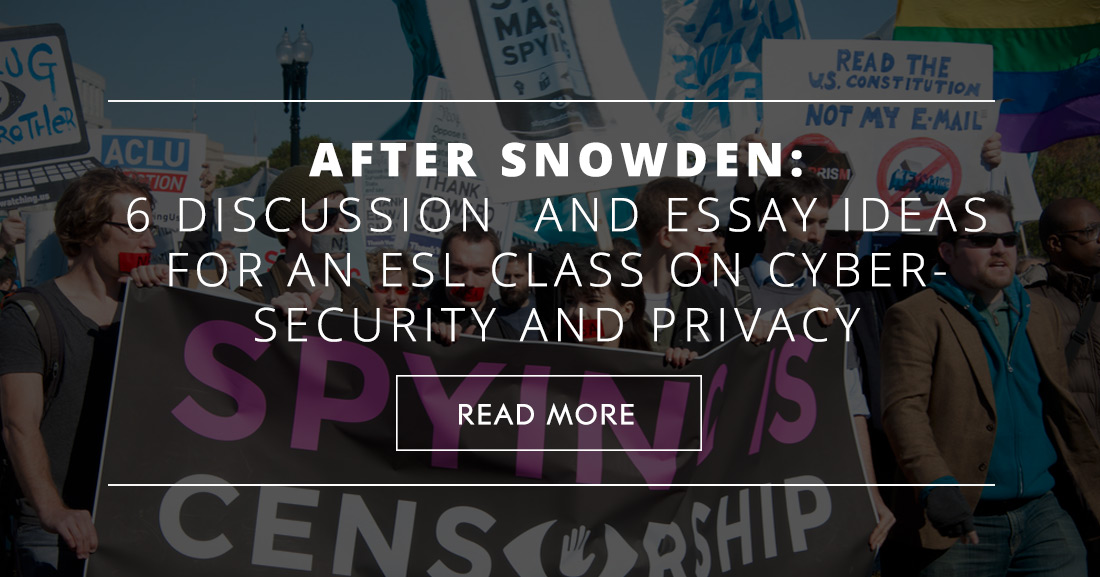
I’ll begin with a question I asked my students, one which is well worth considering: Do you feel safe online?
I clarified that I wasn’t really asking about stalkers or identify thieves, though these concerns were immediately expressed. Instead, I wanted to know if my students felt that their privacy and personal data was adequately protected on the Internet. We found that this was a question which was relevant to everyone. Many had concerns about government surveillance; others didn’t want corporations harvesting and storing their data; still others were rather relaxed and cavalier about it. Earlier on in our discussion, an individual’s name came up, someone who would provide a unique lens through which we might view this problem: Edward Snowden.
Citizen Four
Snowden’s extraordinary decision to blow the whistle on a suite of invasive (and possibly illegal) government surveillance programs turned him into an international figure - a hero to some, a villain to others - and lifted the lid on unprecedented official uses of private data. I began by setting my students the challenge of researching and summarizing Snowden’s story, and I chose to impose a tight timeframe; this is something I do if I feel the students already know the broad strokes of an issue, and it encourages them to read very quickly (an important skill in itself), make quite notes (ditto), and then bring their findings to their group for summarization.
The Data
I had my students summarize the different programs revealed by Snowden. This exercise took some time and required reading about quite technical topics, so I gave my students essentially as much time as required, and helped out with some initial vocabulary:
Surveillance, cyber-security, encryption, classified, data analysis, tracking, tapping, hacking, targeting, intercepting, intelligence gathering, malware, spyware
These words came up so often that we were able to practice them freely, with only a bit of pronunciation guidance from me. Once the students had finished their research, each pair (or small group) gave a short presentation on one of the programs (PRISM, XKeyscore, MYSTIC and others), after which we briefly discussed the capabilities of the program and its implications. For example, MYSTIC collects the metadata (and some content) from every phone call originating in several different countries. My students were immediately sensitive to the potential effect on their privacy, even if the data yielded little or no information about the call. “Should your government know who you called, and when?” I asked, and the response was emphatically negative.
Going Further
A fact-based class revealing Snowden’s work and the nature of the controversial surveillance programs he revealed is useful, and certainly interesting to a majority of students, but I found the subsequent discussions and writing tasks to be the most enjoyable and useful part of this topic. My students are mature enough that I can give them considerable latitude to learn in their own way, with a strong emphasis on focused reading and summarizing. This approach yielded some high-quality essays on privacy and cyber-security, as well as some vigorous in-class debates.
To give further clarity and background, I’d encourage showing your students the film Citizen Four, and if possible the more recent Oliver Stone movie, Snowden. Here are some discussion questions and essay ideas which flow from these topics:
6 Discussion and Essay Ideas for an ESL Class on Cyber-Security and Privacy
-
1
On Edward Snowden
What should happen to Snowden now? Should he be tried in absentia by the US for espionage (a law dating back to 1917), or pardoned?
What would you have done, in a similar position? Would you have risked your life and freedom to reveal these programs to the world?
-
2
On Our Internet Attitudes
Does your online behavior reflect a concern for your own cyber-safety? Do you use a VPN, or encryption software? How paranoid are you about being ‘watched’? Do you cover your webcam when it’s not in use?
Would it change your behavior if you knew, at a given moment, that you were being watched? Would this make you less likely to express your true feelings on certain topics?
-
3
On the Law
How can intelligence programs hope to achieve their objectives if they’re also bound by law (as some believe should be the case) to remain transparent and subject to official and public scrutiny?
What kind of surveillance structure would be acceptable to you? Should governments always be required to acquire a court order, as used to be case before wire-tapping could legally begin, or is this now merely an anachronism?
-
4
On Terrorism
Do you believe that sophisticated surveillance programs assist in combating terrorism? Is there a danger that Snowden’s revelations helped terrorist groups to change their methods and remain undetected?
What is the best response to the use of the Internet by extremists who seek to radicalize others?
Should it be possible to arrest a suspect simply for talking about an attack on the Internet? Should such a discussion be a crime, in your view?
-
5
On Corporate Responsibility
How much responsibility should Internet Service Providers (ISPs) accept for the behavior of their customers? Should ISPs be obliged to suspend service to people who have discussed terrorist acts, for example? What other behavior might see someone disconnected by their ISP?
ISPs can suspend an account due to copyright infringement (i.e. illegal file downloading), so should they also target customers who use VPNs or the secure Tor browser to try to hide what they’re doing?
Should ISPs ever be obliged by law to hand over data? What limits should there be?
-
6
On the Future
How do you see surveillance and intelligence gathering changing as technology becomes more sophisticated? Will we see a generation of people who are simply used to being watched, and regard it as normal? Will there be others who go to extraordinary lengths to hide their online activities?
Design a law which protects privacy while also providing intelligence tools for those trying to combat terrorism and extremism.
There’s no argument that Snowden’s revelations changed the world, and that we’re living in an era of far greater awareness and scrutiny of digital surveillance programs.
It’s an easy argument to make that the intelligence community requires secrecy to successfully carry out its work, but it’s equally straightforward to argue that these services operate for our benefit, and that gathering masses of data from innocent, private citizens creates enormous problems. My students were really fired up about these topics; many of them spend hours a day online, and their Internet lives are in some ways as real and important as their physical lives. Discussing these issues with the most recent teenage generation taught me about their perceptions and concerns, and reminded me that these are issues which will abide for as long as the Internet exists.
P.S. If you enjoyed this article, please help spread it by clicking one of those sharing buttons below. And if you are interested in more, you should follow our Facebook page where we share more about creative, non-boring ways to teach English.








